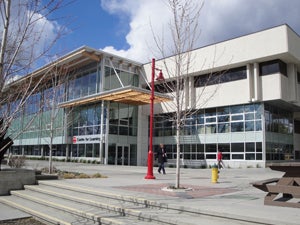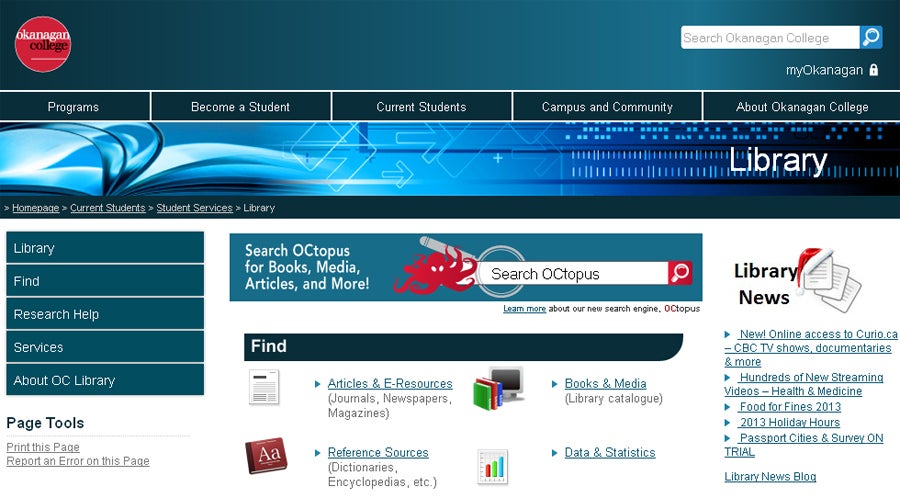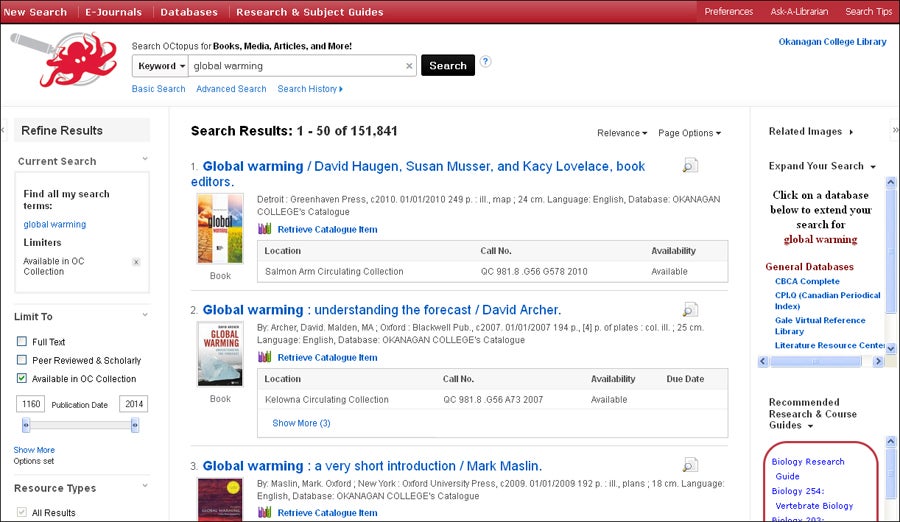
Overview
Located in British Columbia, Canada, Okanagan College serves approximately 4,800 full-time students and 1,200 faculty and staff members. With campuses in Kelowna, Salmon Arm, Vernon, and Penticton, Okanagan College offers a wide variety of diploma, degree, continuing education, and vocational programs. In 2011, the Okanagan College Library aimed to provide its 6,000 users with a simpler way to access its robust research collection. With EBSCO Discovery Service (EDS), the Library has succeeded in delivering a strong research platform that extracts professional, vetted content with the speed and ease of a commercial search engine.
Rather than losing our users to Google and non-authoritative information sources, we introduced a single place for users to begin their research that was easy to use and returned reliable, relevant results.
Rather than losing our users to Google and non-authoritative information sources, we introduced a single place for users to begin their research that was easy to use and returned reliable, relevant results.
Challenges
With 98 databases providing access to more than 60,000 full-text journals, the Okanagan College Library had been looking for an affordable way to surface its growing collection of online and physical resources.
In addition, a 2009 library usability study revealed that students wanted a single search box to find information. A catalogue search box placed on the Library’s home page did not retrieve results across all databases, leaving library leaders to suspect that students were not utilizing all resources effectively. As a result, the Library removed the search box from the main page, leaving students to independently navigate to different databases. These multiple points of entry only confused students more.
Enter EDS.
“Rather than losing our users to Google and non-authoritative information sources, we introduced a single place for users to begin their research that was easy to use and returned reliable, relevant results,” explained Roën Janyk, Okanagan College’s Web Services Librarian. “[EDS] is a great solution as it provides students with the ability to independently search across multiple databases and resource types simultaneously.”
Solutions
Implementation
In July 2010, Okanagan College hired Janyk, who was tasked with bringing a federated or web-scale discovery search product to the Library. Janyk began by reviewing the literature and conducting an environmental scan of the market’s current offerings. Once the product functions that best aligned with the Library’s needs were determined, Janyk narrowed the field to three vendors, including EBSCO. After interviews and product demonstrations with each vendor, the Library Management Committee—made up of Okanagan College’s eight full-time librarians and three term librarians—weighed their options. The Library then decided to take part in the EDS partner program, which allows libraries to demo EDS before making a decision.
“We liked the fact that we could trial EDS,” Janyk said. “It allowed us to see what was possible.”
EDS offered Okanagan Library an affordable search platform that provided real-time availability checks, which allow users to see the availability of an item on the first page of search results. In addition, EDS permitted the Library to integrate non-EBSCO databases into searches via integrated search connectors.
The Library Management Committee decided on EDS, and Janyk began working closely with the systems librarian and collections librarian to streamline the catalog update process, ensuring that records would display properly on the new interface. They worked closely with EBSCO’s Discovery Solutions Coordinator throughout the data migration and customization process. Overall, Janyk said, the implementation went smoothly, and the EDS index was loaded quickly. In addition, Okanagan College Library staff members were able to test the service during the month leading up to the September 6, 2011 launch, allowing them to clear up any inconsistencies.
Janyk said that EBSCO has been very responsive to any issues that arise. “If I send an email to the EDS technical support team, I almost always get a response back within a day, and often it’s less than that,” she explained. “So when you’re stuck on something, it makes a big difference knowing someone is going to reply within the next day.”
Customization & Branding
Since Okanagan subscribes to other EBSCO databases, Janyk said the EDS interface was familiar to users. However, the librarians were concerned users would assume EDS was just another EBSCO database. That is where EBSCO’s unique customization and branding options became extremely useful.
“Another reason why we liked EDS was that it offered customization options that are not complicated to implement,” Janyk said.
To distinguish it from other EBSCO databases, EDS—known as “OCtopus” by Okanagan users—features a red color scheme to match the institution’s colors, along with the College logo. The “OC” in “OCtopus” stands for Okanagan College. The Library also created an octopus avatar that is prominently displayed beside the search box and in marketing materials.
The Library’s research and course guides feature a number of customized subject-specific search boxes for areas such as business, economics and nursing that liaison librarians share with their students.
A customized LibGuides widget lists all of the Library’s research and subject guides alphabetically, so students are never without a place to go for more information or further help.
The Library was also able to embed an AskAway chat box right into EDS. AskAway is a provincial online chat reference service, a collaborative effort of all post-secondary institutions across British Columbia in which participating librarians answer reference questions in real-time. Students seeking research assistance can consult an AskAway librarian from within EDS during set hours.
In terms of authentication, Okanagan has long used EZproxy to authenticate remote users, who must enter their student or employee ID to access the Library’s databases from off-campus.


Promotion & Training
To promote EDS, the Library held a contest to name the search engine. The challenge, which ran September through October, asked students to submit their best name for the new search engine. The Library received more than 100 entries. Librarians then met and selected the top 10 entries, posted them to the library website, and invited the public to vote for their favorite. Jordan Bloomfield, an arts student from the Kelowna campus, submitted the winning name—“OCtopus”—and received an iPod Shuffle donated by EBSCO.
Janyk said it was a great way to involve the student body. “We got the EDS tool for them,” she said, “so we wanted them to have as much input as possible.”
The naming contest served as a great marketing campaign for the new search platform, Janyk said, adding that the arrival of EDS was also announced in “Inside Okanagan,” an internal mailing sent out to faculty and staff every two weeks.
Okanagan College held two main training events for faculty and staff. The first occurred during the College’s annual employee conference in August. Janyk taught two sessions about EDS in which she explained the Library’s rationale for adopting the new search tool and introduced its functionality. The second training event was held at the end of August during the Library’s staff orientation. Again, Janyk presented a short introduction to EDS.
At Okanagan College, all librarians liaise with specific departments, Janyk said. Librarians provide instruction to their departmental subject areas, and EDS instruction is now incorporated right into their regular class sessions.
“We always teach students that this is a great starting point, especially if you are a beginner searcher or if you’re having difficulties finding information,” Janyk said. “You almost always find something that’s relevant to your search.”
Users needing help can also consult an FAQ on the library home page, which links to tutorials located on the EBSCO Support Site, or they can e-mail a librarian directly from within the EDS interface.
Benefits & Results
Okanagan College Library has seen a marked increase in library database traffic since its EDS implementation. Usage sessions in February 2012 almost doubled when compared with usage sessions in February 2011.
Janyk said EDS has also led to an increase in the use of eBooks, so the library has been looking more closely at the future of this content type for the Library. She also noted that the number of Inter-Library Loan requests has significantly decreased since last year. Although she cannot be sure, she attributes the drop to the likelihood that users are finding what they need using EDS.
The reaction among students has been uniformly positive, Janyk notes. “Everybody seems to be using it, and they seem to be excited about the fact that they can find everything in one place,” Janyk said. “[Students] are finding their information without getting frustrated.”
Janyk said she initially feared that faculty members might not be receptive to EDS because they were already comfortable using other research tools, but she has been pleasantly surprised.
“The faculty seems to be pretty open to it and pretty excited,” she said. “Our hope is that they’re going to find things that they would have probably never stumbled across before.”
To learn more about EBSCO Discovery Service, or to request a free trial, click here.